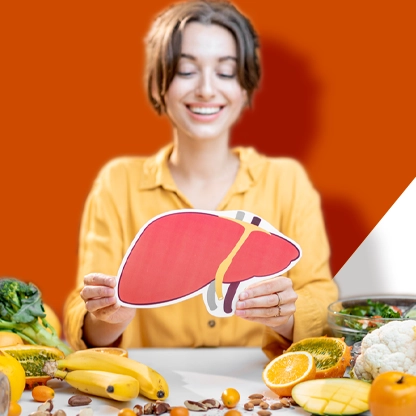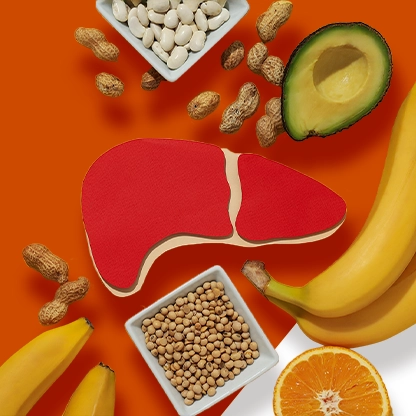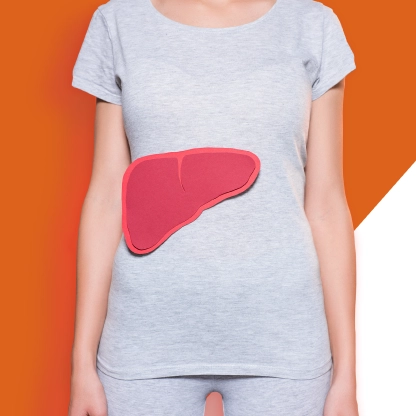.webp)
Article summary
Topic
The liver plays a vital role in keeping you healthy. Did you know it is responsible for more than 500 bodily functions, it’s the largest solid organ in the body, and it can hold about one pint (0.6 L) of blood at any given moment? That’s a pretty big job for something that only weighs about 1.5 kilograms! Read on to learn how your liver is responsible for keeping you healthy, and how it can impact things like your energy levels, appearance, and overall health and wellbeing. You might learn a little something about liver rejuvenation along the way.
What is the Purpose of the Liver?
Your liver is most certainly a jack of all trades as it multitasks to take care of several important bodily functions. As the largest solid organ in the body, it’s responsible for purifying your blood of toxins, regulating blood sugar levels, digesting fats, providing energy, and carrying away waste. It’s also responsible for helping your body resist infections, thanks to its filtering capabilities. So, it’s no exaggeration to say that the liver is one of the hardest-working organs in the body.
Detoxification and Overall Health
Your liver is an expert detoxer. Let’s take a closer look at how the liver operates: we should start by mentioning that substances that enter the body, whether food, drinks, alcohol, etc., eventually flow to the liver. They then get stored, processed, or even detoxed to help your body carry out other important functions. Your liver works overtime to remove any toxins from the body, so everything can function better.
Among the many tasks the liver does, alongside the removal of toxins is the production of energy.i As you might imagine, both of these are great for your body, and can leave you feeling much healthier, and may we dare say it, younger.
There are other perks too. When your liver is healthy and working well, you don’t just experience increased energy levels, but you may notice an improved appearance in your skinii, and who wouldn’t appreciate that?
Accelerate liver regeneration with Phospholipids (Essentiale® Forte P)
Nutrient Metabolism and Energy
The liver is responsible for breaking down the food you eat into useable energy. For example, when you eat carbohydrates, like bread or potatoes, the liver breaks them down into a simple sugar you’ve surely heard of – glucose – and then converts and stores them in a more complex form, which is a substance called glycogeniii. It’s an essential part of a healthy metabolism because it provides the entire body with the fuel it needs to function at its bestiv.
Hormone Regulation
When it comes to regulating hormones, the liver not only cooperates with the endocrine system on the gut – pancreas – liver axis, but it also secretes many hormones itself, as the last decade of research has shownv. The liver is actively involved in the metabolism of many hormones, including endocrine, playing a role in both their activation and deactivation, which results in the excretion of modified forms of hormones in the urine or bilevi. Furthermore, it is worth noting that the liver plays a role in metabolic functions that involve the thyroid as well as steroid glands.6
Antioxidant Production
Antioxidants are a hot topic these days, but it’s important to know a little bit about how they work and what they do. Let’s start with a pair of main protagonists – free radicals and antioxidants.
Free radicals are molecules that have active oxygen. In simpler terms, they are molecules that have one hand free, which they continuously want to grab something with. Their activity can lead to cell damage, so that’s why it’s good when antioxidants (molecules that stabilise the situation) get in their way. Antioxidants come mainly from food – they are carotenoids, polyphenols, and vitamins A, C, and E. But the body also produces its own antioxidant, known as glutathione, in the liver. If, for some reason, the balance between oxidants and antioxidants is disturbed, oxidative stress occurs. This is a dangerous condition for health, and (if prolonged) for life.
Glutathione (GSH) is the most powerful antioxidant found in every cell in the body. Although it is similar to other well-known antioxidants like vitamin C and vitamin E, the remarkable thing is that unlike most antioxidants, the body can make its own glutathione. It only needs the right elements to do so – just three amino acids: Glutamic acid, cysteine, and glycine. By neutralising oxidative stress, glutathione, among other things, supports liver health and plays an important role in liver detoxification. Studies have shown that the liver, when faced with harmful substances, produces more glutathione to prevent damage.
Liver Health and Lifestyle
So now that we know how important the liver is, how can we optimise our lives to make sure this vital organ is taken care of? There are a few lifestyle factors that can set you on the right path to liver wellness, including:vii
- Maintaining a healthy weight
- Following a balanced diet
- Including regular exercise in your daily life
- Limiting or eliminating alcohol consumption
- Practicing safe sex
- Avoiding illegal drugs, and cigarettes as well.
Additionally, you’ll want to adhere to all the advice we’ve received since the onset of the COVID-19 pandemic and continue washing your hands and following good hygiene practices.
Environmental toxins can be a concern, too, so be careful when using aerosol cleaning products, as the liver will pick up those toxins, as well. Wearing a face mask and using these products in a well-ventilated area should do the trick.
Liver Rejuvenation
You may be wondering about some ways to rejuvenate your liver. It’s a remarkable organ that’s always doing its best to help your body. But there are a few things you can do to give this powerhouse organ a bit of a break, and ensure it keeps working at its full capacity.
- Moderate alcohol consumption. Staying off the sauce for at least four to six weeks can help reverse the effects of alcohol-associated liver disease (ALD).viii
- Pay attention to the medications and supplements you take. Talk to your doctor for advice, but it can help your liver to only take certain medications and supplements when you (or your healthcare provider) feel it’s absolutely necessary.8
- Watch your weight. Following a healthy diet, including grains, fibres, and proteins, as well as limiting processed and sugary foods, is a great way to help your liver.8
- Avoid infections. This one refers to maintaining up-to-date vaccinations, practicing safe sex, avoiding sharing needles, not sharing personal hygiene items like nail clippers and razors, and using reputable tattoo artists and piercers.8
All of these things can help your liver help you to stay healthy.
Common Liver Diseases
Although the liver is the only organ that has regenerative properties, it needs to be taken care of in order to keep the whole body in good shape. Because it’s responsible for so many vital processes, it’s also susceptible to a variety of different diseases. These diseases can be caused by viruses, drugs and alcohol, genetics, or even cancer. Let’s take a look at a few of the most common.
- Hepatitis. This is a swelling and inflammation of the liver, and it’s usually diagnosed as either hepatitis A, B, or C. It can lead to liver damage, or even liver cancer or liver failure, and one of its symptoms, like cirrhosis, is an unhealthy, yellowish appearance in your skin and eyes.ix
- Hepatic steatosis. Strictly speaking, an excess of fat in the liver is called hepatic steatosis, and it’s a main factor in developing metabolic dysfunction associated steatotic liver disease, or MASLD (until recently known as non-alcoholic fatty liver disease, or NAFLD). It may not cause any immediate, day-to-day problems for you, but over time, it can slow down your liver’s ability to function and lead to inflammation, excess scar tissue, and eventually cirrhosis.x
- Cirrhosis. Cirrhosis happens when your liver has too much scar tissue and is unable to function properly to keep you healthy.11 With cirrhosis, you may notice symptoms like itchy or even yellowing skin and eyes – perhaps not the most serious symptoms, but definitely some that will contribute to an aging, or unhealthy appearance.xi
When to Call a Doctor
There are a variety of symptoms associated with liver disease, and we don’t want to generalise too much here, but tiredness, loss of appetite, nausea, itchy skin, and jaundice can all be symptoms of cirrhosis, for example.xii If you experience any of these for an extended period of time, and suspect you may have some liver issues, it’s important to see your healthcare provider right away to discuss what might be going on and what you can do about it.
Frequently Asked Questions About the Role of Liver in Feeling Young
Your liver’s got your back, so it’s important to treat it kindly. Following a healthy diet and lifestyle, including exercise and limited alcohol consumption are great ways to start. You’ll also want to maintain good hygiene habits, practice safe sex, and avoid exposure to toxins to help give your liver a break and let it get on with its important work.
There may not be any particular fast track to repairing your liver, but it will thank you for taking a few important steps toward its recovery. As mentioned before, follow a healthy diet, and limit or avoid alcohol consumption. Try to consume plenty of fibre, lean proteins (like chicken, seafood, or beans), and get plenty of water each day.
It’s a pretty individual question, and one that you’ll probably want to discuss with your healthcare provider, taking into consideration your diet and lifestyle. But, generally speaking, and when it comes to removing alcohol from your life, your liver can begin to heal within a few days. It can take additional weeks or months to rejuvenate the liver naturally after damage from alcohol, but some liver damage is reversible.
The liver is a resilient organ, and it can do a lot to repair itself – with a little help from you, of course. The liver can regenerate with new cells, rather than scar tissue, but once scar tissue is present, it may be difficult to undo the damage. Pay attention to lifestyle factors like smoking, alcohol use, hygiene, diet, and exercise to prevent damage in the first place.
We’ve said it before, but the liver is a very unique organ – one that is capable of carrying out vital metabolic processes, and one that can also regenerate as needed, if taken care of. When your organs are healthy, you’re more likely to enjoy a healthy lifestyle, full of energy. Look to these tips to keep your liver healthy, and youthfulness and vitality won’t be far behind.
%20(1)%20(1).webp)
.webp)


